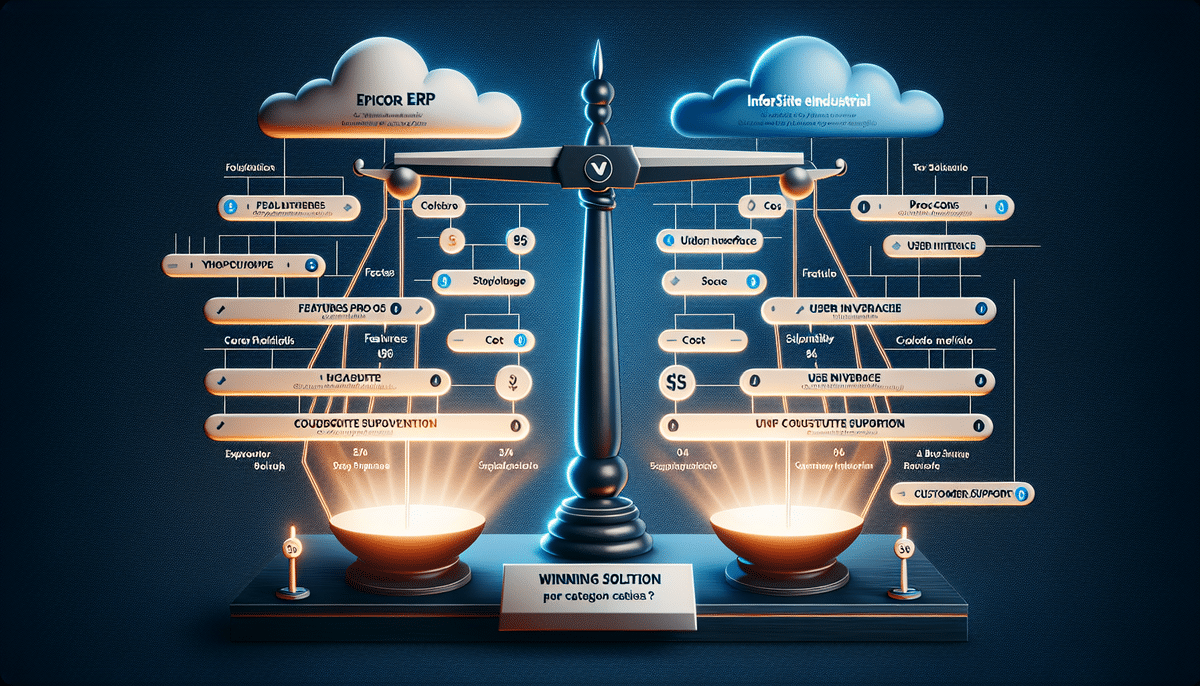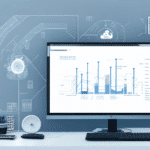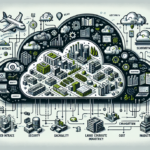Epicor ERP vs Infor CloudSuite Industrial (SyteLine)
Choosing the right Enterprise Resource Planning (ERP) system is crucial for optimizing business operations and driving growth. Among the top contenders in the market, Epicor ERP and Infor CloudSuite Industrial (SyteLine) stand out for their robust features and scalability. This comprehensive comparison delves into their functionalities, advantages, drawbacks, scalability, user experience, costs, integration capabilities, customer support, and more to aid businesses in making an informed decision.
Overview of Epicor ERP and Infor CloudSuite Industrial (SyteLine)
Epicor ERP
Epicor ERP is a versatile ERP solution tailored for small to medium-sized enterprises. It encompasses modules for financial management, inventory control, production management, customer relationship management (CRM), and more. Renowned for its user-friendly interface and customizable dashboards, Epicor ERP facilitates seamless data access and analysis.
For more details, visit Epicor ERP.
Infor CloudSuite Industrial (SyteLine)
Infor CloudSuite Industrial (SyteLine) is designed for larger enterprises with complex manufacturing and distribution operations. It offers advanced tools for planning, scheduling, materials management, financial operations, and CRM. Infor CloudSuite Industrial is celebrated for its sophisticated planning and scheduling capabilities, which are essential for optimizing production workflows.
Learn more at Infor CloudSuite Industrial.
Key Features Comparison
Epicor ERP Features
- Financial Management
- Inventory Management
- Production Management
- Customer Relationship Management (CRM)
- Supply Chain Management
- Mobile Accessibility
- Business Analytics
- Customer Portals
Infor CloudSuite Industrial (SyteLine) Features
- Advanced Planning and Scheduling (APS)
- Customer Management
- Materials Management
- Financial Management
- Sales Management
- Mobile Accessibility
- Advanced Analytics
- Workbench Collaboration
Both ERP systems offer extensive customization and robust security features, ensuring that businesses can tailor the platforms to their specific needs while safeguarding sensitive data. According to Gartner's Magic Quadrant, both Epicor and Infor provide strong integration capabilities, allowing seamless connectivity with other business applications.
Pros and Cons
Epicor ERP
- Pros:
- Highly customizable with flexible workflows and integrations.
- Scalable architecture suitable for various business sizes.
- User-friendly interface with intuitive dashboards.
- Cons:
- Implementation can be costly and time-consuming.
- May require a dedicated IT team or external consultants for optimal use.
- Some users find the user interface less intuitive compared to competitors.
Infor CloudSuite Industrial (SyteLine)
- Pros:
- Robust functionality for complex manufacturing and distribution.
- Highly configurable with seamless integration with other Infor products.
- Real-time data analytics for informed decision-making.
- Intuitive interface enhances ease of navigation.
- Cons:
- Implementation may require significant customization, increasing time and cost.
- Higher costs may be prohibitive for small businesses.
- Potentially overly complex for businesses with simple operational needs.
Scalability and Flexibility
Scalability is a pivotal factor when selecting an ERP system. Epicor ERP is well-suited for small to medium-sized businesses, offering a flexible architecture that supports growth without significant overhauls. Its modular design allows businesses to add functionalities as needed, facilitating seamless scaling.
In contrast, Infor CloudSuite Industrial (SyteLine) targets larger enterprises with intricate manufacturing and distribution requirements. While it offers extensive scalability, it often necessitates more comprehensive customization and configuration to meet evolving business needs. According to a Forbes article, scalability ensures that ERP systems can adapt to increasing data volumes and user numbers without compromising performance.
User Interface and Experience
Epicor ERP
Epicor ERP features a modern, intuitive user interface with extensive customization options. Users can tailor dashboards to display relevant data, enhancing productivity and reducing the learning curve. The mobile app further extends accessibility, enabling employees to access critical information on the go.
Infor CloudSuite Industrial (SyteLine)
Infor CloudSuite Industrial offers a more traditional interface that may require additional training for users to maximize its potential. While it includes mobile access, the app's functionality is more basic compared to Epicor's, potentially impacting user experience for mobile-first operations.
Cost: Implementation and Maintenance
The cost of deploying and maintaining an ERP system varies based on several factors, including organizational size, number of users, and required modules. Epicor ERP typically incurs higher upfront costs due to its comprehensive feature set. However, its extensive functionalities, such as advanced supply chain and CRM, can provide significant ROI for businesses that leverage these tools effectively.
Infor CloudSuite Industrial (SyteLine) may offer more cost-effective solutions for medium to large enterprises, especially those requiring advanced manufacturing and distribution capabilities. Being a cloud-based solution, it reduces the need for on-premises hardware and infrastructure, potentially lowering overall costs. However, the total cost of ownership can escalate with extensive customization and integration needs.
For a detailed cost analysis, refer to Software Advice's ERP Cost Guide.
Integration Capabilities
Integration capabilities are essential for ensuring that the ERP system interfaces seamlessly with other business applications.
Epicor ERP
Epicor ERP excels in integration, offering extensive compatibility with systems like Microsoft Office, Salesforce, and various e-commerce platforms. Its robust API library and pre-built connectors facilitate real-time data synchronization, enhancing operational efficiency.
Additional integrations can be explored through Epicor's integration partner network.
Infor CloudSuite Industrial (SyteLine)
Infor CloudSuite Industrial supports integration with other Infor products and third-party systems via its open architecture and web services. While it provides essential integration tools, Epicor's broader range of pre-built connectors offers a competitive edge for businesses requiring diverse system integrations.
Discover more about Infor's integration options at Infor Integrations.
Customer Support and Service
Epicor ERP
Epicor ERP provides comprehensive customer support, including a detailed knowledge base, customer portals, and multi-channel support options such as phone and email. This ensures that users can access assistance promptly when needed, enhancing overall user satisfaction.
Explore Epicor's support services at Epicor Support.
Infor CloudSuite Industrial (SyteLine)
Infor CloudSuite Industrial primarily offers support through a self-service portal and email. While effective, it lacks the multi-channel support options available with Epicor, which might be a consideration for businesses that require more immediate or varied support interactions.
Learn more about Infor's support offerings at Infor Services.
Case Studies and Industry Applications
Epicor ERP Implementations
Epicor ERP has been successfully adopted by companies such as Optimas Solutions, Merit Medical Systems, and Custom Metalcraft. These implementations have facilitated enhanced operational efficiency, streamlined workflows, and strategic growth initiatives.
Infor CloudSuite Industrial (SyteLine) Implementations
Infor CloudSuite Industrial (SyteLine) has been implemented by companies like Peerless Industries, Accuride Corporation, and Johanson Technology. These case studies highlight the platform's capability to support complex manufacturing processes and large-scale distribution operations.
Industry Suitability
Epicor ERP is versatile and suitable for a wide range of industries, including manufacturing, distribution, retail, and services. Its flexibility and broad feature set make it an excellent choice for businesses seeking a robust yet adaptable ERP solution.
Infor CloudSuite Industrial (SyteLine) is specifically engineered for industries with complex manufacturing and distribution needs, such as automotive, aerospace, and heavy machinery. Its advanced planning and scheduling tools are particularly beneficial for sectors requiring meticulous production management.
For industry-specific insights, refer to Gartner's Industry Reports.
Security and Compliance
Both ERP systems prioritize security to protect sensitive business data and ensure compliance with industry regulations.
- Epicor ERP: Implements role-based security, access controls, and audit trails to ensure that only authorized personnel can access specific data and functionalities. Additionally, it complies with standards such as GDPR and HIPAA, providing businesses with the tools needed to maintain regulatory compliance.
- Infor CloudSuite Industrial (SyteLine): Offers robust security controls, including password complexity requirements and data encryption. Its comprehensive security framework ensures data integrity and compliance with industry-specific regulations.
For more on ERP security best practices, visit CSO Online's ERP Security Guide.
Making the Right Choice
When selecting between Epicor ERP and Infor CloudSuite Industrial (SyteLine), consider the following factors:
- Business Size and Complexity: Epicor is ideal for small to medium-sized businesses, while Infor is better suited for larger enterprises with complex operations.
- Industry Requirements: Infor excels in industries with intricate manufacturing and distribution needs.
- Budget: Evaluate total cost of ownership, including implementation and maintenance costs.
- Scalability: Consider how well the ERP system can scale with your business growth.
- Integration Needs: Ensure the ERP can seamlessly integrate with your existing systems.
- User Experience: Assess the ease of use and training requirements for your team.
- Customer Support: Evaluate the quality and accessibility of customer support services.
By thoroughly assessing these aspects, businesses can select the ERP solution that best aligns with their strategic objectives and operational needs.
Future Developments and Outlook
Both Epicor ERP and Infor CloudSuite Industrial (SyteLine) are continuously evolving to meet the dynamic demands of the business landscape.
- Epicor ERP: Plans to enhance its cloud offerings, providing greater flexibility and scalability. Future updates are expected to integrate more advanced analytics and machine learning capabilities to support data-driven decision-making.
- Infor CloudSuite Industrial (SyteLine): Aims to introduce new modules and applications that further streamline manufacturing and distribution processes. The platform is also expected to incorporate more artificial intelligence features to optimize operations and predictive maintenance.
Staying abreast of these developments ensures that businesses can leverage the latest technologies to maintain a competitive edge.
Conclusion
Both Epicor ERP and Infor CloudSuite Industrial (SyteLine) are powerful ERP platforms offering a range of features tailored to different business needs. Epicor ERP is ideal for small to medium-sized businesses seeking flexibility and a broad feature set, while Infor CloudSuite Industrial (SyteLine) caters to larger enterprises with complex manufacturing and distribution requirements. By carefully evaluating each platform's strengths in relation to your specific business objectives, you can implement an ERP system that fosters growth, enhances efficiency, and supports long-term success.




















